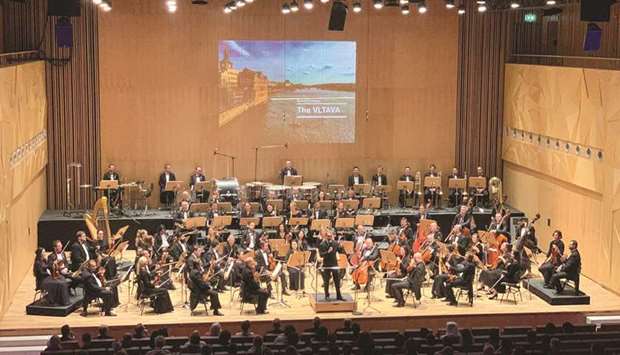Qatar National Convention Centre (QNCC) continues to host an amazing splendour of the Western orchestra music as Qatar Philharmonic Orchestra (QPO) recently organised its second concert of the season.
The concert named ‘The Moldau: The Noon Witch And Others’ attracted music lovers in large numbers as usual. The majority of the audience consisted of the expatriates and diplomats from the Western countries.
The concert featured David Niemann, a German conductor and narrator, who led QPO on an evening of mesmerising classical music. The concert included Bedich Smetana’s composition Vltava (The Moldau), from Má Vlast (My Country) – a set of six symphonic poems composed between 1874 and 1879.
Smetana (2 March 1824 – 12 May 1884) was a Czech composer who pioneered the development of a musical style that became closely identified with his country’s aspirations to independent statehood. He has been regarded in his homeland as the father of Czech music. Internationally he is best known for his opera The Bartered Bride and for the symphonic cycle Má vlast which portrays the history, legends and landscape of the composer’s native Bohemia. It contains the famous symphonic poem Vltava, also known by its English name The Moldau.
The second piece of the concert was Antonín Dvoák’s The Noon Witch, Op. 108. It is a symphonic poem written in 1896 which was inspired by the Karel Jaromír Erben poem Polednice from the collection Kytice. Polednice is based on the noon demon Lady Midday of Slavic mythology. It is one of a set of late orchestral works inspired by national themes which were written after his return to his native Bohemia from the United States.
Dvoák (8 September 1841 – 1 May 1904) was a Czech composer, one of the first to achieve worldwide recognition. Following the Romantic-era nationalist example of his predecessor Bedich Smetana, Dvoák frequently employed rhythms and other aspects of the folk music of Moravia and his native Bohemia. Dvoák’s own style has been described as the fullest recreation of a national idiom with that of the symphonic tradition, absorbing folk influences and finding effective ways of using them.
The third piece of the evening was Gioachino Rossini’s Overture to Guillaume Tell (William Tell). It is the overture to the opera William Tell (original French title Guillaume Tell), whose music. William Tell premiered in 1829 and was the last of Rossini’s 39 operas, after which he went into semi-retirement. The overture is in four parts, each following without pause.
Rossini (29 February 1792 – 13 November 1868) was an Italian composer who gained fame for his 39 operas, although he also wrote many songs, some chamber music and piano pieces, and some sacred music. He set new standards for both comic and serious opera before retiring from large-scale composition while still in his thirties, at the height of his popularity.
The final composition was Richard Strauss’s Don Juan, Trv 156, Op. 20. It is a tone poem in E major for large orchestra written in 1888. It is singled out as a musical symbol of fin-de-siècle modernism, particularly for the breakaway mood of its opening bars.
Strauss (11 June 1864 – 8 September 1949) was a German composer, conductor, pianist, and violinist. Considered a leading composer of the late Romantic and early modern eras, he has been described as a successor of Richard Wagner and Franz Liszt. He along with Gustav Mahler, represents the late flowering of German Romanticism after Wagner, in which pioneering subtleties of orchestration are combined with an advanced harmonic style.
Talking with Community, Kurt Meister, QPO Executive Director, said: “It was a great evening of European orchestral music. This was our second concert of the season that promises to present sophisticated European and Arabic orchestral music for enthusiasts in Doha.”
Speaking about the conductor, he said: “David Niemann is fast establishing himself as one of the most promising conductors of his generation. Second prize winner of the 2015 Malko Conducting Competition, he was appointed the assistant conductor at the Opéra Orchestre National Montpellier, where he worked alongside chief conductor Michael Schønwandt from 2015 to 2018.
“His recent highlights include a special interdisciplinary project with Junge Deutsche Philharmonie featuring new commissions with the most renowned artists of the German-speaking poetry slam scene; Austrian composer Arnold Schoenberg’s A Survivor from Warsaw, paired with Beethoven’s Choral Symphony, to open the Barcelona concert season of the Valles Symphony in the iconic Palau de la Musica in Barcelona.
“He has returned to QPO this season to enthral music enthusiasts. David is all set to lead a few more orchestral concerts this season with QPO.”

..
